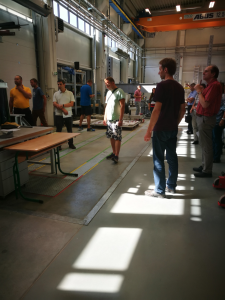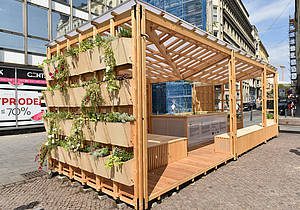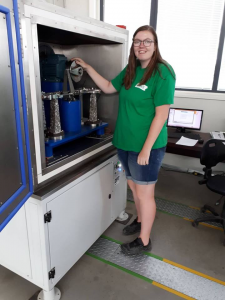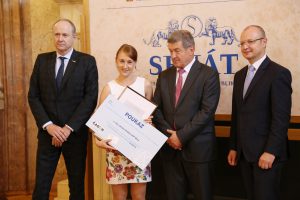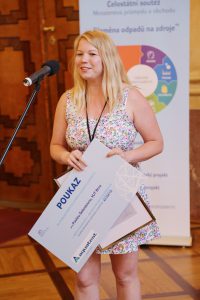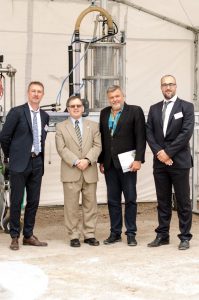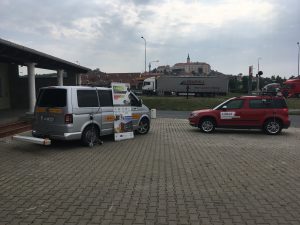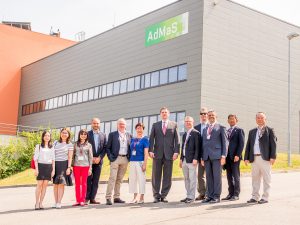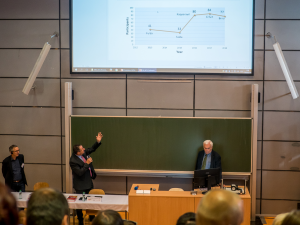
On 19 June 2018, the “5th WTA Colloquium – Remediation of Concrete Structures” took place at BUT . The colloquium was organized under the auspices of Dean of the Faculty of Civil Engineering – prof. Ing. Miroslav Bajera, CSc., BUT in cooperation with WTA International and the Faculty of Civil Engineering of the Brno University of Technology together with the SSBK (Association for Remediation of Concrete Structures) in cooperation with the Scientific and Technical Society for Rehabilitation of Buildings and Sustainable Care. The colloquium provided the participants with the latest knowledge in the field of remediation of concrete structures and also the possibility of establishing new contacts among important experts both from the Czech Republic and abroad.
After the 5th year, the colloquium has become a traditional international meeting of academics, companies and others to share new insights into the remediation of concrete structures. Every year, the event takes place under the leadership of “WTA International” in various countries. Previous years were held in Fulda (2013, 2015), Rapperswil (2016) and Erfurt (2017). So far, the previous years have taken place in the German-speaking countries (Germany and Switzerland), so it was a great honor to organize the 5th year of the Colloquium at the Technical University in Brno to extend the event to another European country. In Brno, the Colloquium was conducted in English with the possibility of simultaneous translation and took pride in receiving a large number of participants – experts, Ph.D. students and the professional public. The specific topics discussed at the Colloquium included new remedial materials and technologies, control, maintenance and protection of concrete and reinforced concrete structures.
The introductory speech took place at the opening of the Colloquium by the President of WTA CZ – prof. Ing. Rostislav Drochytka, CSc., MBA, Dean of the Faculty of Civil Engineering – prof. Ing. Miroslav Bajer, CSc., Chairman of WTA International TC5 Concrete – prof. Dr. -Ing. Rolf Gieler and President of SSBK – Ing. Aleš Jakubík. In the introductory word, the participants were welcomed, acquainted with the Scientific and Technical Society for Remediation of Buildings and Land Conservation – WTA International, SSBK and the entire course of the Colloquium.
The introductory speech was followed by lectures by both Czech and foreign lecturers. The colloquium has provided the latest knowledge in the field of remediation of concrete structures to owners of listed buildings, planning and engineering staff, building firms and manufacturers, consultants, experts, architects, representatives of offices and other stakeholders. The concrete problems of the remediation of concrete structures have been the main topic in the lectures of Ing. Josef Žák, Ph.D. – “BIM technology in the preparation and implementation of building projects”, prof. Dr. -Ing. Ralf Arndt – “Non-destructive Testing of Reinforced Concrete Structures”, prof. Dr. -Ing. Rolf Gieler – “Engineer-technical proofs of the life span of reinforced concrete structures according to future sets of rules – experiences and examples”, Dr. -Ing. Kay-Andre Bode – “Remediation of Wind Turbine Generator Foundations”, Doc. Ing. Ladislav Klusáček, CSc. – “Causes of Suspension of Suspension Bridges and Bridges”, Doc. Ing. Jiří Kolísko, Ph.D. – “Diagnostic Survey of the Liben Bridge in Prague”, Doc. Ing. Jiří Dohnálek, CSc. – “History of Concrete in the Czech Lands from the 19th Century to the Present”, JUDr. Ing. Zdeněk Dufek, Ph.D. – “Public Investors’ Approach to Financing the Repair and Maintenance of Building Structures”, Dipl.-Ing. Reinhard Martin – “Experiences with Structures of Energy Production”, prof. Ing. Rostislav Drochytka, CSc., MBA – “New Possibilities of Remediated Materials”, Prof. Ing. Dr. -Ing. Gesa Kapteina – “Application of corrosion monitoring and inclusion of upgraded data for the calculated life span” and Doc. Ing. Vít Šmilauer, Ph.D. – “Effect of hydration kinetics on long-term behavior of concrete structures”. Due to the high expertise of prominent lecturers, the action for all involved was very interesting and beneficial. Due to big significance, great interest and participation in the WTA Colloquium, we will look forward to another year.
More information about WTA International and events can be viewed at: <www.wta.cz>, <www.wta.de>.
